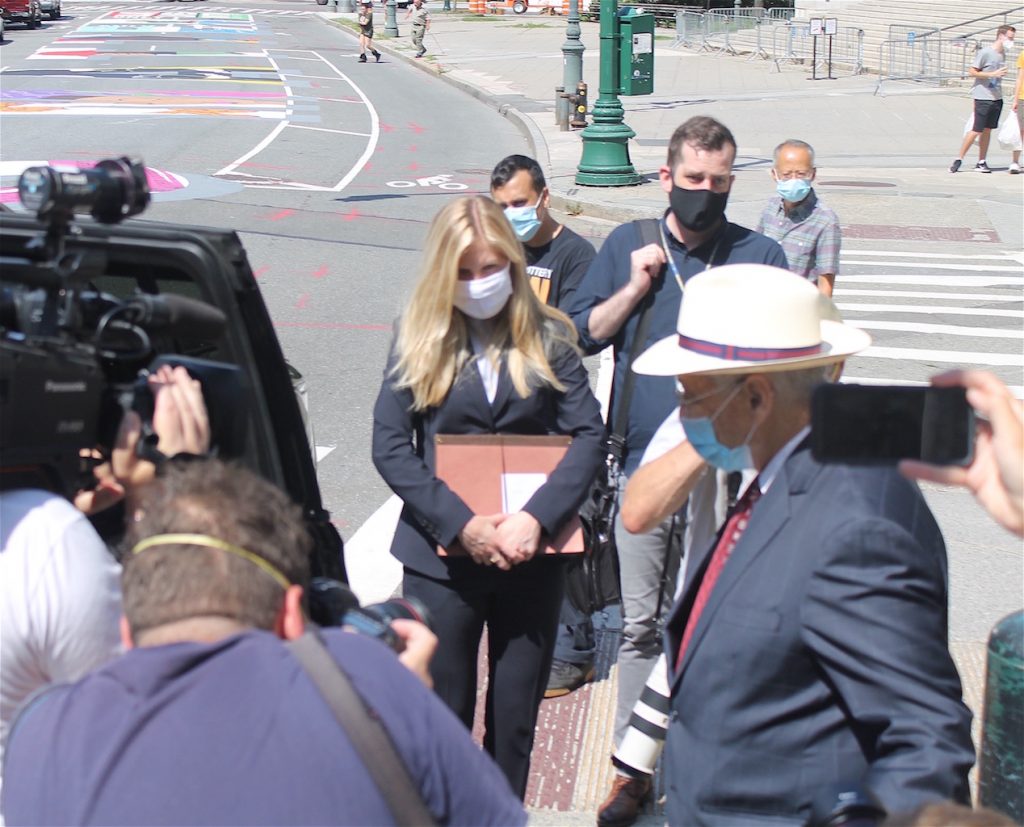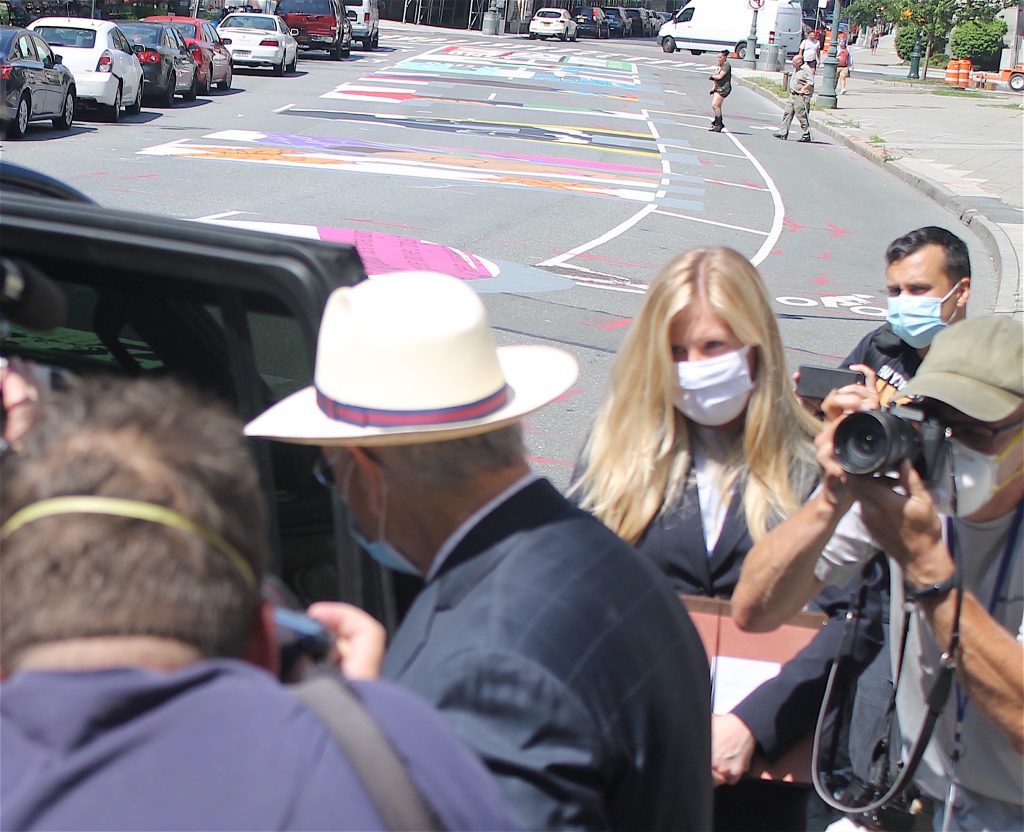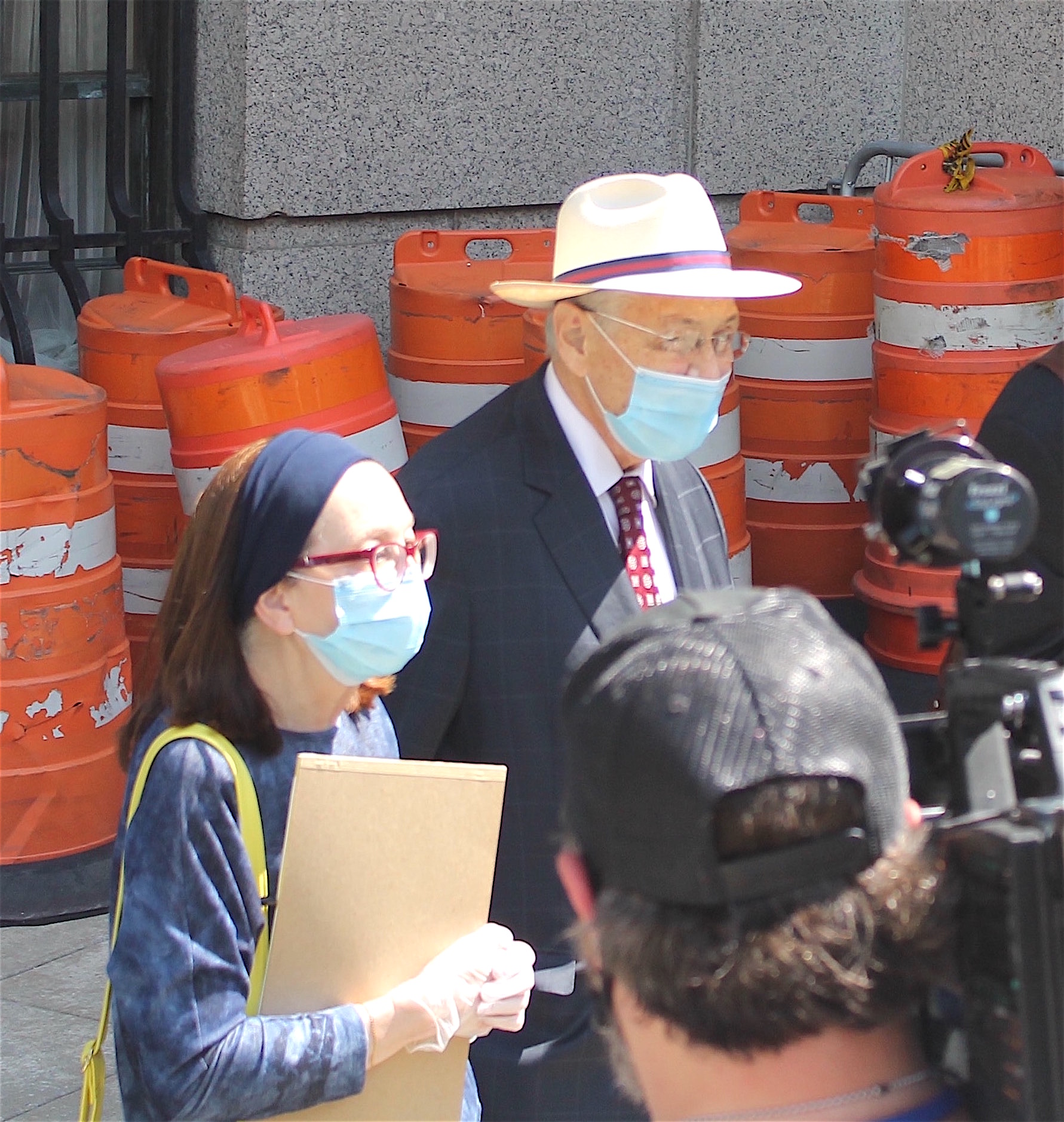BY THE VILLAGE SUN | Shelly Silver said he was “very sorry” for profiting from kickback schemes while leading the state Assembly. And he regretfully admitted that it “destroyed his legacy” as one of New York’s most powerful politicians.
Meanwhile, Silver’s attorney said it would be unsafe to incarcerate the 76-year-old fallen lawmaker during the current coronavirus pandemic.
But federal Judge Valerie Caproni was unswayed. On Monday afternoon she sentenced Silver to six-and-a-half years in prison, plus a $1 million fine ($250,000 on each of four counts).
The former longtime powerbroker — a lifelong Lower East Sider — was previously convicted twice on corruption charges. In 2017, the convictions were overturned based on changes in the U.S. Supreme Court’s definition of corruption. He was then convicted again in 2018 and sentenced to seven years, but appealed. Earlier this year, the majority of the convictions were upheld.
The former Assembly speaker recently sent Caproni a letter, admitting to wrongdoing and apologizing. The judge allowed him to make a statement in court Monday, during which Silver reiterated points from his letter.
Rising from his seat and pulling down his blue surgical mask, he steadied himself with one clear latex-gloved hand on the table in front of him.
His wife, Rosa, wearing a blue headband, and also a face mask and latex gloves, sat in the row behind him.
“I know that a lot of people have lost faith in their government,” Silver said. “[I] contributed to that loss of faith and certainly have not helped that situation. It’s very painful for me and I’m sorry.”
Referring to his years leading the state Legislature, Silver said he felt he did a lot of good while in office. He was known as one of the “three men in a room” who call the shots on the state’s bills and budgets.
“I thought I was pretty good at it and I helped a lot of people,” he said, though adding, “I destroyed that legacy of 35 years.
“I was angry at myself and I still am, but now that anger has turned to sadness,” Silver said. “My use of my office for personal gain was improper, selfish and it undermined the trust of the people of New York.
“Let me just say, I’m very sorry.”

Silver was originally convicted of accepting $4 million in kickbacks in two schemes. In the end, the charges for one of the schemes — involving a Columbia University doctor making asbestos-client referrals to Silver’s law firm — were tossed out due to the statute of limitations. The convictions on a scheme involving real estate companies and a Lower Manhattan tax firm, however, were upheld.
Caproni said Silver had certainly helped people but that it didn’t offset his misdeeds — or the need for a sentence “long enough to send a message to Albany.”
“Today he has finally acknowledged to himself and to the public the wrongness of his conduct — it’s a long time coming,” she said.
“This was corruption, pure and simple,” she stated.
At the same time, the judge said, “Despite the corrupt payments, Mr. Silver has always acted in the public good. … Like many white-collar criminals, Shelly Silver is not evil to the core.”
And yet, she panned the former speaker’s letter to her as “self-pitying,” adding, “Even now, it’s not entirely clear that Mr. Silver really gets it.
Others within the court and legal system were calling for sentences of from 18 years to 10 years, but she termed that excessive.
“I think a double-digit sentence would fail to take account of your age and the good you did in office,” Caproni told Silver.
She noted that former state Senate Majority Leader Dean Skelos — who was convicted on bribery and extortion charges — was recently released from prison to serve the last two years of his sentence under home confinement. Silver could have landed a similar deal and have been getting out around now, too, she said.
Instead, she said, Silver had two years out on bail to be with his family and “live on his pension.”
“Now,” she declared, “the time has come for Mr. Silver to pay the piper.”
Ultimately, she only shaved half a year off of Silver’s original sentence from 2018.
Caproni acknowledged the risk of COVID-19 for inmates, but said she felt the federal prison system is actually doing a better job containing the virus than the country as a whole. She said of the Bureau of Prisons’ nearly 130,000 inmates, 99 have died from coronavirus, for a death rate of 0.66 per 1,000. Meanwhile, there have been 32,000 COVID-related deaths in New York State, she noted. There have been more than 140,000 deaths from the virus nationwide.
“COVID has changed the calculus,” the judge admitted. “I understand Mr. Silver’s desire not to die in prison. I take COVID very seriously.”
However, she said she assumed the Bureau of Prisons will require inmates to wear face masks and wash their hands.
“I cannot guarantee that Mr. Silver will not contract COVID in prison,” she noted. “But I cannot guarantee that he will not get it outside of prison.”
In short, she said of the B.O.P., “other than a few prisons” with outbreaks, “the statistics look pretty good — they’ve been doing a pretty good job.”
Caproni added that Silver would likely serve his time in what’s known as a prison camp. She was referring to a minimum-security facility where inmates live in a dorm setting, with limited or no perimeter fencing. According to the New York Post, Silver’s attorneys have requested that he be incarcerated at Otisville, N.Y. (According to B.O.P., six inmates and one staff member at Otisville currently have confirmed active cases of coronavirus.)
The judge said Silver must surrender for imprisonment by Aug. 26, though he has the right to appeal the sentencing within the next 14 days.
Before Caproni handed down the sentence, Silver’s lawyer argued for a lighter term of mostly home confinement with “rigorous community service.”
He said Silver is old and frail and would be at real risk of contracting COVID, if incarcerated.
“When I first met Mr. Silver, he seemed so much older to me than the person I had seen on TV and in the newspapers,” his attorney said. “He doesn’t walk fast. His legs fill with water. … The last two years have been hard years for him.”
The attorney referred to glowing testimonials and letters that Silver’s supporters had sent on his behalf. During his time in office, the former politician shouldered the burden of being a lawmaker and made a real difference, he said.
“Generally, Mr. Silver was a compassionate, kind and caring person who worked hard to help people,” he said. “He took it on and made people’s lives better. … Good acts and kind works don’t overcome the conduct of corruption [but] he’s done a lot of good.”

The attorney noted that because Silver has preexisting health conditions, imprisoning him amid the pandemic poses a “substantial risk.” He cited a supporting opinion on Silver’s case by a Columbia University doctor who stated, “The risk is very real.”
The attorney added that Silver, prior to the pandemic, was attending synagogue every day, sometimes more than once a day, implying that the former speaker is doing much soul searching and leaning on his faith after his fall from power.
Attorney Pete Gleason — who formerly ran for City Council in Lower Manhattan’s District 1, as well as for Manhattan district attorney — was among those in the courtroom at 40 Centre St. on Monday. People had to sit 6 feet apart from each other on spots marked on the benches, while others watched from an “overflow room.”
Gleason doesn’t think Silver should do jail time — though he had earlier predicted that Silver would serve his time at Otisville.
“I don’t think he should die in prison,” he said.
Instead, he suggests Silver be sentenced to “an appropriate period of probation” — plus write a confessional book on his own corruption.
Gleason included his proposal in what he labeled a “victim impact statement” that he sent to the court on July 17. In the statement, Gleason alleges that Judy Rapfogel, Silver’s former chief of staff, “did everything in her power to undermine” his 2009 campaign for City Council.
Gleason’s proposed sentence for Silver, as outlined in his statement, is: “On consent of the defendant, he sits down with a ghostwriter, selected by the U.S. Attorney’s Office, and pens a tell-all book, with all profits going back into the public coffers. This would certainly be a bestseller and bring in much-needed revenue while doing more for public integrity than the now-defunct Moreland Commission.”
The attorney, who formerly lived in Tribeca, said Silver might as well appeal, if he has the finances to do so.
“He can certainly appeal the sentence,” he said. “In the process of the appeal, he can request a stay on the incarceration. If a stay is granted, he would not have to turn himself in to prison until his appeal is heard and decided.”
Health concerns over the pandemic also could factor into Silver’s appeal, Gleason said, noting, “Given the state of affairs in the prison system with COVID-19, he may get more sympathy with the appellate court then he did at the trial court.”
However, it’s not clear at this point if Shelly Silver has any more appeals left in him.


good thing he is not an African American, there would be no talk of leniency.
I agree with attorney Gleason’s recommendation, which would be far more beneficial to the defendant and the public than imprisonment in Otisville. Forbes deemed Otisville “America’s cushiest prison.” It is the recognized prison of choice for Jewish felons because it provides kosher meals and allows for the celebration of all Jewish holidays, which is almost daily. Understanding in detail the way in which Sheldon Silver became corrupted by the political system would be of great use in informing prosecutors and the public as to future investigations.